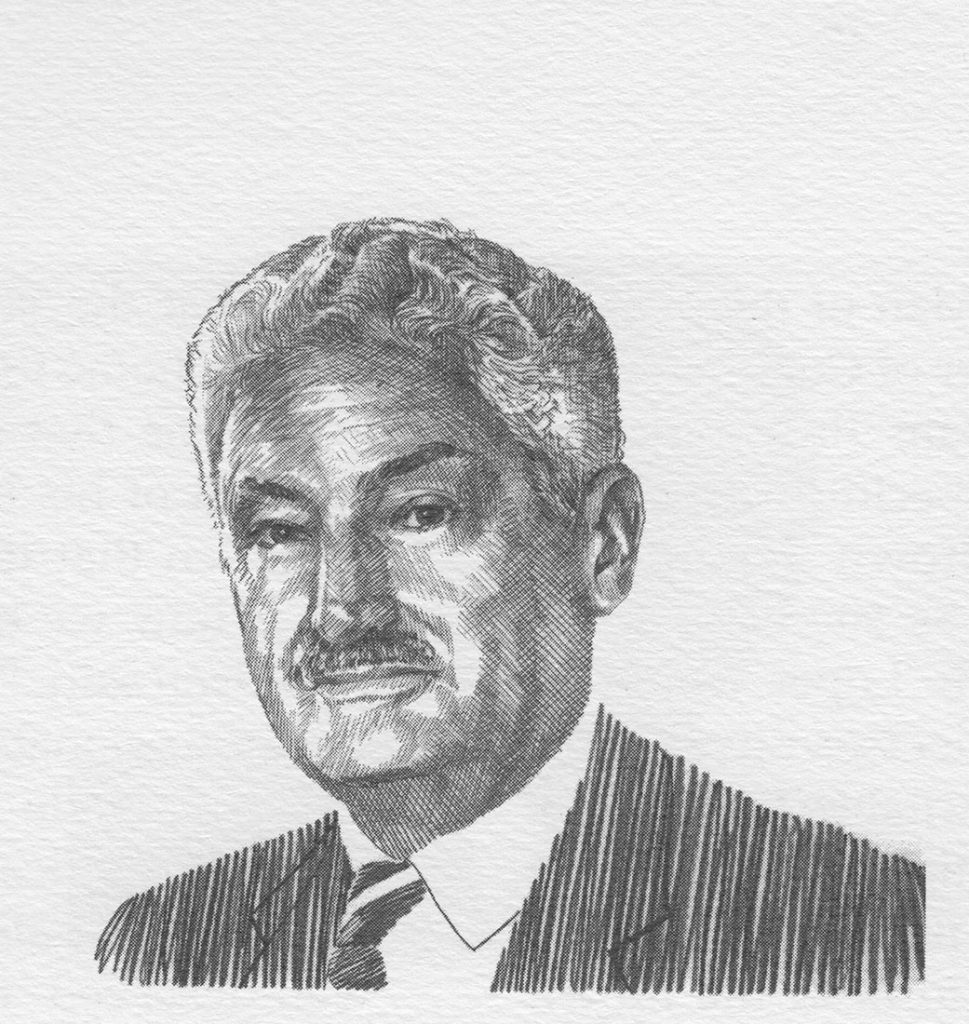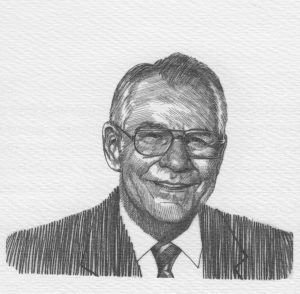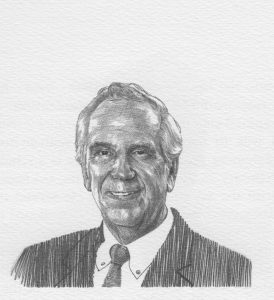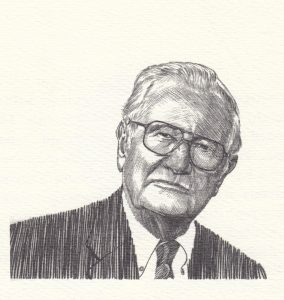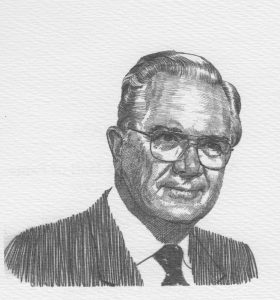Earl McGowin decided early on in his career as an elected official not to play political games with the voters of Alabama.
“I went out to the people of Butler County with a number of disadvantages,” he recalled late in his life. “I was inexperienced, young, and I had a mustache.” That mustache, wrote Alabama journalist James Saxon Childers, told a story about McGowin that nothing else could tell so well.
When he was thinking of running for office, a friend told him to shave it off. Earl said, “It’s my mustache. It’s a part of me. If I should shave it off, I’d be doing a political trick and I’m damned if I’ll start by tricking them, by pretending something merely to get their votes. They’ll have to take me with my mustache and all my other detriments, or else they’ll have to leave me out.” They took him.
Earl Mason McGowin was born November 18, 1901, to James Greeley McGowin and Essie Stallworth McGowin in Brewton, Alabama. A product of the public schools of Chapman and Greenville, Alabama, he received a degree from The University of Alabama in 1921, graduating Phi Beta Kappa. Out of fourteen candidates from Alabama, he was elected a Rhodes Scholar and attended Pembroke College at Oxford University in England from 1922-1925. Earl’s zest for politics, friends said later, was kindled during that time. Again, words from journalist James Childers: “Earl would go to the House of Commons to listen to the debates … always it was government with McGowin. That was what he was studying at Oxford.” Although Earl returned home to the family business after his experience abroad, his ties with the British institution and the program remained strong. The well-stocked McGowin library at Pembroke College, donated by the family in 1974, is one of the prominent landmarks of the campus, and Earl served for many years as secretary of the Alabama Rhodes Scholarship selection committee.
In the book Earl McGowin of Alabama, the story is told of the young McGowin’s return to Chapman to work at W.T. Smith Lumber Company. He arrived from Europe Friday, September 1, 1925. His father greeted him with warmth, but also with the admonition: “I’ll expect you at work Monday morning. Remember, you’re on your own.” Earl quickly became immersed in and conversant with the administrative acts of sawmilling, learning of lumber and mills, ripsaws, and railroads. He and his brothers, as operators of one of the largest lumber companies in the South, were front-runners in putting into practice the concept of the sustained yield – the idea of treating trees as a crop and adhering strictly to selective cutting to extend the lifespan of a forest indefinitely.
And some of the Oxford-educated mill worker’s most lasting accomplishments were in the area of resource management and forest conservation. He spearheaded the passage of legislation outlawing the practice of burning millions of acres of woodlands for pasture (Alabama’s “stock law “); improving forest fire protection and control programs; and forming the Alabama Forest Products Association. In 1941 he was elected president of the Southern Pine Association – at forty, one of the youngest executive officers in the group’s history. He was also instrumental in Governor Chauncey Sparks’ selection at the end of World War II of Auburn University as the site of Alabama’s School of Forestry.
And although the family sold W.T. Smith Lumber and its some 197,000 acres of timberland for approximately $50 million at the height of the concern’s success in 1966, Earl would remain in the lumber business, becoming increasingly active in the fight for improved lumber standards and quality control with the Southern Pine Inspection Bureau, of which he had been chairman of the board since 1960. He was simultaneously engaged in other efforts to develop uniform American lumber standards as chairman of the American Lumber Standards Committee of the U.S. Department of Commerce.
But Earl McGowin was not known in the public service arena strictly for his work regarding forestry issues. The gentleman began his political career in 1930 as an elected member of the Alabama House of Representatives, and throughout his five-term career as a state legislator, displayed a stubborn integrity – perhaps best exemplified in his refusal to have any dealings with the then-powerful Ku Klux Klan, and in his efforts in the reform of state government while serving as Governor Frank M. Dixon’s House floor leader. In recognition of his contributions, he was voted “Legislator of the Year” in 1939 by the Alabama Press Association, and Dixon also appointed him as a member of the State Board of Education.
While Earl was making his mark on state history as a legislator, he also added some extremely significant chapters to his personal history. He married Miss Ellen Pratt December 29, 1937, and the couple would go on to have two children, daughter Florence McGowin Uhlhorn and son Earl Mason McGowin, Jr. And in 1942, much to the chagrin of those in Butler County who would have had him remain at home in charge of a lumber concern that was then playing a vital role in the war effort, he volunteered his services to the U.S. Navy, turning down an opportunity to serve as speaker of the House.
Earl was accepted by the Navy as a senior lieutenant, and after a few weeks was assigned to open a Navy lumber unit in Jacksonville, Florida. He eventually became chief of the Memphis and New Orleans offices of the Central Procuring Agency and Navy Lumber Coordinating Unit, jointly operated by the Army and Navy, and was also in charge of a unit at Shreveport. The Alabamian’s contributions to his country while on active duty did not go unnoticed; he received a citation for outstanding performance of duty during World War II from Secretary of the Navy James Forrestal.
In 1949, at the age of 48, Earl declined to run for a sixth term in office. That did not, however, end his career as a statesman. In 1950 he was appointed director of the Department of Conservation, and he served as director of the Alabama State Docks from 1959 to 1963. It was during this time that Ellen Pratt McGowin, who had been fighting a battle with cancer, passed away in 1962. Earl remarried July 28, 1964, taking Claudia Pipes Milling, widow of New Orleans attorney Robert E. Milling, as his bride.
As a member of the legislature, Earl McGowin had led extensive efforts to reform and enhance education in Alabama, and his interest in this area continued throughout his life. He served as president of the University of Alabama National Alumni Association from 1950-51, was an emeritus trustee of the Alabama Association of Independent Colleges, and in 1970 at the age of sixty-nine was named the first chairman of the newly formed Alabama Commission on Higher Education. In 1975 his former political foe, Governor George Wallace, inducted him into the State Academy of Honor for these and other accomplishments.
So much could be written to memorialize the life of Earl Mason McGowin, but perhaps his own words best capture the spirit of the man. “In retrospect,” he said in the mid-1980s, “I have enjoyed a full life.”
Earl McGowin died June 2, 1992, at his home in Chapman.

